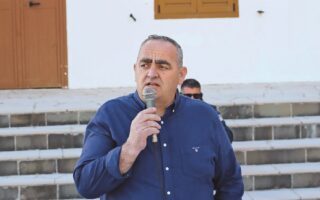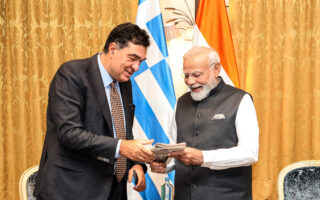It’s a shame the IMF has left
Flood protection work is not carried out because it does not serve electoral expediencies, says veteran politician and liberal flag-bearer

At the age of 83 and with a political legacy of tangible achievements that have stood the test of time, Stefanos Manos could be spending his days enjoying the peace of his suburban Athens home with his wife, with whom he marked 59 years of marriage on the day he met with Kathimerini. But the elder statesman and former politician – for many years the flag-bearer of the perennially under-represented liberal camp in Greece – is worried. He sees the country woefully unprepared for the challenges lying ahead and the center-right government unwilling to make the big, controversial changes needed. And he has never been the kind of person not to speak his mind. Here are some of the more salient parts of our expansive discussion.
In March, in the wake of the deadly rail crash at Tempe, you told Kathimerini’s podcast, Radio K, that the Greek state is in the process of collapsing. Six months later – after the wildfires, the floods, the unimpeded offensive by the Croatian hooligans, the murder of Antonis Karyiotis at the port of Piraeus – is this feeling even more intense?
Of course it is, much more intense. But I want to be specific and, if possible, practical. I’ll start with this disaster [the floods in Thessaly]. The minister, [Christos] Staikouras, comes out and says that the railway, over which there has been such a fuss since Tempe, will continue to be cut in two for two months (which means four). That’s outrageous. Just as it is outrageous that we have spent so many billions of euros on a railway we still don’t have. Not to mention the sense that they’ll do the same all over again. They laid the tracks in basins that flood. They used the wrong studies, which they were wrong to ever accept. Everyone is responsible. The tracks should have been raised and this is how the new tracks need to be laid; yet I haven’t heard anyone saying this simple thing yet.
They laid the tracks in basins that flood. They used the wrong studies, which they were wrong to ever accept. Everyone is responsible’
The same is the case with the national highway; that’s why it turned into a river. The highway needs to be raised too, so that next time we have extreme rainfall – which may be next year instead of 16,000 years down the line as [Academy of Athens Secretary-General Christos] Zerefos said – we’ll be prepared.
I also want to express my concern about the fact that there’s an issue with Athens’ protection from floods. This is an issue that needs to be examined by a serious committee and its findings need to be made public. The fact that Vassilissis Sofias Avenue flooded as it did cannot be brushed off. Why did it happen? People nearly drowned in the center of Athens.
Do you think that the climate crisis is being used as an excuse more than as an impetus to upgrade the country’s infrastructure properly?
I have served as minister for public works and I carried out land acquisitions all the time. Expropriations make a lot of people angry and have no electoral benefits for the person carrying them out, but they are necessary for public works to be implemented. It is the same with anti-flood works. Their benefits are not visible, so it’s money spent without bringing votes.
A string of issues that have been in the public spotlight in recent months – from the railway and illegal construction on beaches to the state of recycling and the laws for preventing fires – have demonstrated that the problem does not lie with the legislation, but with its implementation. How do you explain this massive lapse?
I’ll start with the same point: Politicians do not want to displease citizens. That is why the draft constitution I had put forward, which was prepared right here, at this table, stipulated that ministers could not also serve as MPs. If they are elected as a lawmaker and appointed as a minister, they would have to leave their seat and they could not run again in the next election either. No one was willing to even discuss this; not even George Gerapetritis, who was part of the team that drew up the draft constitution.
One hoped that this government would have laid more emphasis on the implementation of the law. Take the incident at Piraeus, for example, where a bunch of ruffians threw a man into the sea and killed him. What have we learned since? That the ferry left port with its loading ramp open, which happens all the time and which – as I now know – is illegal. That there were no coast guard officials at the scene, which is also illegal. Why hasn’t the government – which is ineffective, incapable of making a decision – installed security cameras at every passenger port in the country? There are around 180 of them. Doing so would give us a picture of what happens at every port, at no great expense, and all the people who work there would know that they are being watched. The same goes for traffic violations. The relevant minister spoke of raising the cost of fines. The people who break the law are never caught, however, because the police are nowhere to be seen on the streets. So why shouldn’t cameras be installed to record the license plate number of the cars that run red lights so that the fine can be sent directly to the driver?
And while we’re on the subject of the police, I hear that there are more than 1,000 officers guarding people from different areas of public life. I quote the number with some caution. But the least I would like is to know who is being guarded and by how many police officers.
What is your assessment of the bailout memorandums’ contribution to the restructuring of the Greek state? Public finances improved, on the one hand, but vital services were dismantled, on the other. What is the final tally?
Positive, I would say. It’s just unfortunate that [the creditors’ technocrats] are gone. Everyone celebrated the departure of the International Monetary Fund, but I said, “What a shame.” These were people who were dedicated to their work and knew what they were talking about.
The Greek system certainly showed incredible resistance to the dictates of the bailout programs.
Yes, the thieves banded together. It resisted as much as it could. Look, when the time came to take on the system, all the politicians caved. [Kostas] Simitis set out with the drive to fight it, but he caved. [Kostas] Karamanlis didn’t even try. I don’t think [Antonis] Samaras did anything at all, and [Kyriakos] Mitsotakis, who I had hoped would do something, has not.
Do you think that public sentiment has changed since you were a minister toward certain matters which are vital to the country’s ability to move forward, such as private initiative and competition, performance evaluations in the public sector and fiscal discipline? Or does it still stand in the way of essential reforms?
Public opinion, the public’s stance, is something we’d see only if something were to happen. When nothing is being done, what’s there to react to? If the government started firing people that weren’t needed from the public sector tomorrow, we’d see how public opinion reacts. It needs to be roused by real events, which the government is not producing.
Let me mention a specific example: I have been reading that a lot of our weapons are not available for use, because there are no contracts for their maintenance, there are no parts, there are no technicians to repair them etc. It is a persistent blight. The result is that the Greek state, like every good nouveau-riche spendthrift, goes out and buys new ones instead of mending the ones it has.
We’re now getting ready to acquire F-35s. I have doubts as to whether we should be doing that. They will cost 4 billion euros – roughly what the cost of repairing the damage on the Thessaly Plain is estimated to be. The war in Ukraine has shown us how much the nature of warfare has changed. Are you confident that we have studied all of these changes and adapted our system accordingly? Ukraine constantly produces new defense systems, even while it’s being bombed. So do other countries in the region, like Israel and Turkey. We don’t produce anything.
We allowed the Hellenic Aerospace Industry (EAV) and Hellenic Defense Systems (EAS) to be staffed by the cronies of governments and retirees. Back in 1974, the government of national unity invited me to take part in a team that would examine what could be done with EAS. It was my first brush with the public sector. I recommended that Lockheed should take it over. The proposal was opposed by the chief of the air force and we went at it hammer and tongs. They wanted the air force to keep the business and their side prevailed. So they kept the business – and ran it into the ground.
So let’s privatize them, now, in the next six months. Otherwise, let’s just shut them down and make room for new, innovative companies that can support our defense industry.





